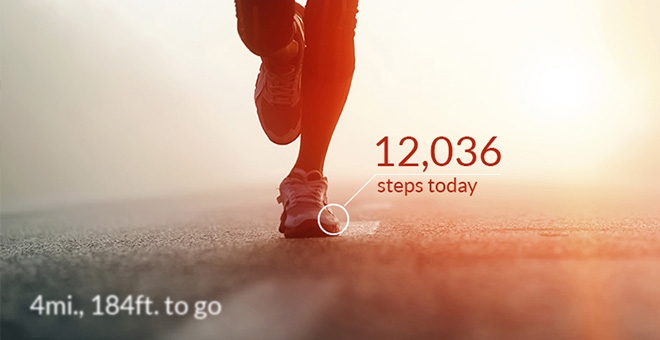Maybe it is not too late, when you think about it.
Just like many other aspects of my life, I am late in the adoption of self-tracking tools, after a well-fought battle against my resistance to changing my habits. But maybe it is not too late, when you think about it.
As a late adopter, I have had the opportunity to evaluate and choose among a wide offering of apps and trackers developed at an advanced stage, a growing number of start-ups in healthcare, data visualization tools and to think about what’s next.
Four months of scrupulous and regular use of few but good apps ensued with regular data input on food, workouts, water intake, sleep and mood.
The personal use, testing, and study of what is going on around this topic is not separate from my job, and the personal considerations lead inevitably to think about what I could share of my experience in general.
When I proudly share my data about calories burned or sleep hours with my friends, instead of looks of amazement or encouraging applause, I receive perplex looks and dubious smirks. Like: why are you investing your time in self-tracking if you don’t need to lose weight? Or if you are not an athlete? Or if you don’t have a pathology to monitor? Or if you don’t quit smoking?
Luckily, I am self-motivated enough not to give up my scrupulous tracking of calories intake, even without sophisticated gamification techniques and support from my non-virtual community.
The scepticism of my non-virtual community is probably due to the lack of a relevant objective(for them?) like losing 5 kg of weight, improve my athletic performance of a given percentage, or reduce the saturated fat intake.
I still don’t feel the need to share my activities with one of the app-related virtual communities, although I would receive more support, recognition and appreciation for my daily 5.500 steps goal reached. Maybe to start sharing my activities within these communities, a shared and challenging objective on my part may be required.
But, do we really need a relevant, or better shared, objective to be supported by your virtual and non-virtual communities? Or for them to be motivated to start or improve the self-tracking activities?
Couldn’t the monitoring itself be a relevant objective already? It is a commitment indeed, and having accomplished it for four months, it is already a success and a goal in itself for me.
The data monitoring activity of these last four months, even without a relevant and shared objective, led to some behaviour changes.
First of all, the main result is the awareness of self. For example, now I know that I sleep far less than I thought, and above all less than I personally need. Now that I know that sleeping 6h 40m is not enough for me to feel rested the day after, I feel the stimulus to go to bed earlier. Or, through the personalised content that the apps push on my phone, I know that it is better to reduce the useless sugars. And now I simply shifted from the low fat fruit yoghurt, to the full fat one, that contains more fats but doesn’t have added sugars. Also, when there are only few steps left to reach my daily objective, I decide to walk to have a coffee instead of taking the car. In summary, the knowledge of my data, the awareness about my real habits, is leading me to progressively change my habits and to influence my decisions.
This is a positive effect, indeed. But there is another aspect to take into consideration.
Now that I know that having my favourite dish in my favourite restaurant will cost me 1000 calories, my satisfaction is actually reduced when I patronise the place.
So, what is the trigger that really causes the behaviour change?
Is it the satisfaction to see that my sleep trend is improving or the feeling of unease for having eaten too many sweets?
Or is it the real benefits of the behaviour change or an aggravation of the control mania?
Is this the reward for having stepped out from my comfort zone and the natural anxiety that results from this?
Both.
If eating less sugar makes me feel good and bad at the same time, it is maybe the price of the awareness.
So, four months of data. What happens now? I read and test graphs and tables in various formats, to understand how the visualisation of my data can help me to interpret them and evaluate the next steps.
The results that I have seen so far seem valid at a visualisation level, but they neither support me in the interpretation of my data, nor recommend how to outline the next steps.
For example, what are the benefits of having balanced the intake for carbs, proteins and fats for a protracted time?
How can I deduce a link between what I eat, how I sleep and my mood?
And maybe where I live? And the type of work I do? And the weather? And the hormonal cycles? And my allergies?…
The list goes on and perhaps some more time (and data) is needed before I will be able to have the complete picture of aggregate data relevant for me. But in the meanwhile, what I am missing now is how to interpret my data.
I see three possible ways of supporting the user in the interpretation of data:
- Crowdsourced or Community
- Community of experts
- Automated interpretation
Considering the stage I am at now, the community of experts is the one I would consult to receive support. The automated interpretation is (and will be) also valid, assuming that I am supported by the push of related educational content that is relevant to me.
In conclusion, beyond the virtual and non-virtual community, gamification techniques and social sharing, the motivation is generated by the “intimate” and personal interpretation of the data. In cases like mine, motivation is produced by the data intimacy, and not by elements of external influence.
The objectivity of data registered by trackers, depending on how they are used and applied, can allow an individual and personalised way to generate the sense of motivation that is more appropriate to each individual.





